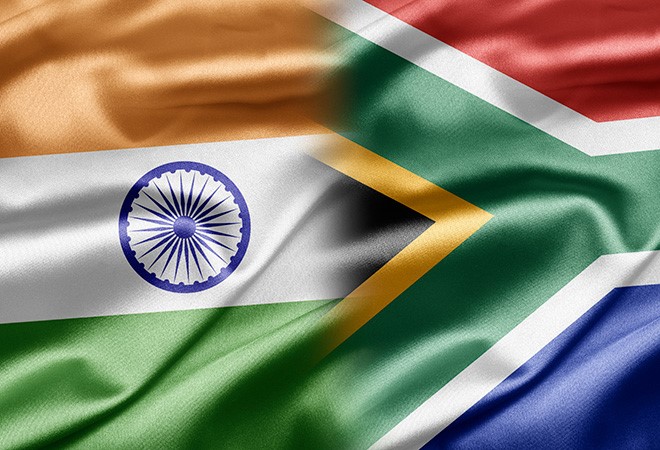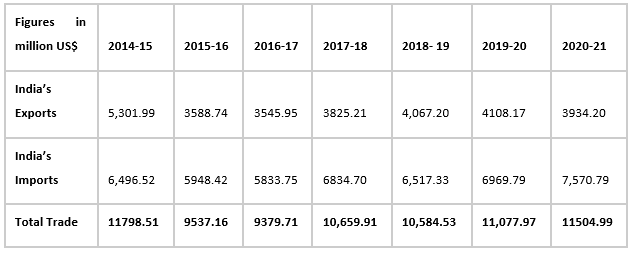Description

Copyright infringement not intended
Context: The Union Cabinet, chaired by the Hon’ble Prime Minister Shri Narendra Modi, has approved signing of the Memorandum of Understanding (MoU) between the Government of India and the Government of Republic of South Africa for cooperation in Disability Sector.
Details:
- The bilateral Memorandum of Understanding will encourage cooperation between the Department of Empowerment of Persons with Disabilities, Government of the Republic of India and Government of South Africa through joint initiatives in the disability sector.
- It will strengthen bilateral ties between India and South Africa. Specific proposals for cooperation between the two countries, as mutually agreed upon, will be taken up for implementation during the period of validity of the Memorandum of Understanding.
.jpeg)
India - South Africa Relations- A Background:
Historical Background
- India’s links with the struggle for freedom and justice in South Africa date back to the period during which Mahatma Gandhi started his Satyagraha movement in South Africa over a century ago.
- India was also at the forefront of the international community in its support to the anti-apartheid movement; it was the first country to sever trade relations with the apartheid Government (in 1946) and subsequently imposed a complete - diplomatic, commercial, cultural and sports - embargo on South Africa.
- India worked consistently to put the issue of apartheid on the agenda of the UN, NAM and other multilateral organizations and for the imposition of comprehensive international sanctions against South Africa.
- The ANC maintained a representative office in New Delhi from the 1960s onwards. India actively worked for the AFRICA Fund to sustain the struggle through support to the frontline countries.
- Following talks between the then South African Government and the ANC, India’s relations with South Africa were restored after a gap of over four decades with the opening of a Cultural Centre in Johannesburg in May 1993.
- An Agreement establishing full diplomatic and consular relations with South Africa was signed on 22 November 1993.
- A Consulate General was thereafter established in Johannesburg. The Indian High Commission in Pretoria was opened in May 1994, followed by the opening of the Consulate General in Durban the same month. Since Parliament in South Africa meets in Cape Town, a permanent office of the High Commission was opened there in 1996, which has been re-designated as Consulate General of India with effect from January 2011.
Political Relations
- India and South Africa established a strategic partnership in March 1997.
- 2017 marked 20 years of our Strategic Partnership and 2018 marked 25 years since the re-establishment of diplomatic relations with South Africa.
- 2018 also marked 125 years since the Pietermaritzburg ‘incident’ involving Mahatma Gandhi.
- Against the background of India’s consistent support to the anti-apartheid struggle, there has been a steady consolidation of our close and friendly ties with South Africa, both bilaterally and through BRICS, IBSA and other Fora.
- A number of bilateral agreements have been concluded between the two countries since the assumption of diplomatic relations in 1993 in diverse areas ranging from economic and commercial cooperation, defence, culture, heath, human settlements, public administration and science and technology. India’s Technical and Economic Cooperation Programme (ITEC) has been a useful medium of promoting cooperation in development of human resources.
High-Level meetings
- There are regular high-level visits
- Exchanges between the Parliaments are another dimension in our bilateral dimensions.
Joint Ministerial Commission and Foreign Office Consultations
- The India-South Africa Joint Ministerial Commission at the level of Foreign Ministers was set up in 1994.
- In 2020, India hosted the 10th South Africa-India Joint Ministerial Commission (JMC).
Defence Cooperation
The Defence Cooperation between India and South Africa officially commenced in 1996 with the signing of an MoU on “Cooperation in the field of Defence Equipment” which was replaced by an MoU on “Defence Cooperation” in 2000.

Skills Development
To address the shortage of skills among South Africans which is a national priority of the Government of South Africa, an MoU on the setting up of the “Gandhi-Mandela Centre of Specialisation for Artisan Skills”(GMCoS) in South Africa was signed during the Prime Minister’s visit to South Africa in July 2018.
Commercial & Economic Relations
Recent bilateral trade figures are as follows:

- Major Indian exports to South Africa include vehicles and components, transport equipment, drugs and pharmaceuticals, engineering goods, footwear, dyes and intermediates, chemicals, textiles, rice, and gems and jewellery, etc.
- Major Indian imports from South Africa include gold, steam coal, copper ores & concentrates, phosphoric acid, manganese ore, aluminium ingots & other minerals.
Science and Technology
India and South Africa signed an Agreement on Cooperation in the fields of Science and Technology on 19 July 1995 and cooperation in Science and Technology between the two countries has flourished and continues to grow.
Cultural Relations
- For the academic year 2020-21, 30 slots have been allocated to South Africa under ICCR . ITEC offered a total of 52 slots to South Africa in 2019-20.
- With the help of the Indian Council for Cultural Relations (ICCR), an intensive programme of cultural exchanges are organised throughout South Africa including scholarships for South African nationals.
Indian Community
- The South African Indian origin community numbers around 1 million and constitutes about 3% of South Africa’s total population.
- About 80% of the Indian community lives in the province of KwaZulu Natal, about 15% in the Gauteng (previously Transvaal) area and the remaining 5% in Cape Town.
- South Africans of Indian origin are well-represented in Government, business, media, legal and other professions.


https://www.pib.gov.in/PressReleasePage.aspx?PRID=1899443














